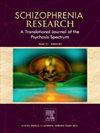How does attachment affect help-seeking in people with paranoia and psychosis? The role of emotion regulation, self-stigma, and perceived support
IF 3.5
2区 医学
Q1 PSYCHIATRY
引用次数: 0
Abstract
Longer duration of untreated psychosis causes significant human and healthcare costs. Attachment avoidance and anxiety contribute to delays in help-seeking and help-acceptance in individuals with both non-clinical and clinical paranoia, though underlying mechanisms remain unclear. The aim of the study was to examine how attachment affects help-seeking and help-acceptance in people with paranoia. We recruited a non-clinical sample with paranoia (N = 501) and a clinical psychosis sample (N = 120), and found that attachment avoidance predicted reduced help-seeking and help-acceptance intentions in both groups, while attachment anxiety predicted lower social help-seeking in the clinical group. Emotion regulation did not mediate associations between attachment and help-seeking/acceptance. Self-stigma regarding help-seeking and mental illness mediated these associations in both groups, while perceived availability of help mediated the link between avoidance and help-seeking/acceptance in the non-clinical group. This is the first study to show that self-stigma and perceived help availability delay help-seeking in paranoia. Further research should investigate causal effects of attachment on self-stigma and perceived support, and so help-seeking.
依恋如何影响偏执和精神病患者的求助?情绪调节、自我污名和感知支持的作用
精神病长期得不到治疗会造成巨大的人力和医疗费用。依恋回避和焦虑导致非临床和临床偏执狂个体寻求帮助和接受帮助的延迟,尽管潜在的机制尚不清楚。这项研究的目的是研究依恋是如何影响偏执患者寻求帮助和接受帮助的。我们招募了非临床偏执狂样本(N = 501)和临床精神病样本(N = 120),发现依恋回避预测了两组患者寻求帮助和接受帮助的意愿降低,而依恋焦虑预测了临床组患者寻求社会帮助的意愿降低。情感调节在依恋和求助/接受之间没有中介作用。在两组中,寻求帮助和精神疾病方面的自我耻辱感介导了这些关联,而在非临床组中,感知到的帮助可得性介导了回避与寻求帮助/接受之间的联系。这是第一项研究表明,自我耻辱和感知到的帮助可获得性延迟了偏执患者的求助。进一步的研究应探讨依恋对自我耻辱感和感知支持的因果影响,从而影响求助。
本文章由计算机程序翻译,如有差异,请以英文原文为准。
求助全文
约1分钟内获得全文
求助全文
来源期刊

Schizophrenia Research
医学-精神病学
CiteScore
7.50
自引率
8.90%
发文量
429
审稿时长
10.2 weeks
期刊介绍:
As official journal of the Schizophrenia International Research Society (SIRS) Schizophrenia Research is THE journal of choice for international researchers and clinicians to share their work with the global schizophrenia research community. More than 6000 institutes have online or print (or both) access to this journal - the largest specialist journal in the field, with the largest readership!
Schizophrenia Research''s time to first decision is as fast as 6 weeks and its publishing speed is as fast as 4 weeks until online publication (corrected proof/Article in Press) after acceptance and 14 weeks from acceptance until publication in a printed issue.
The journal publishes novel papers that really contribute to understanding the biology and treatment of schizophrenic disorders; Schizophrenia Research brings together biological, clinical and psychological research in order to stimulate the synthesis of findings from all disciplines involved in improving patient outcomes in schizophrenia.
 求助内容:
求助内容: 应助结果提醒方式:
应助结果提醒方式:


